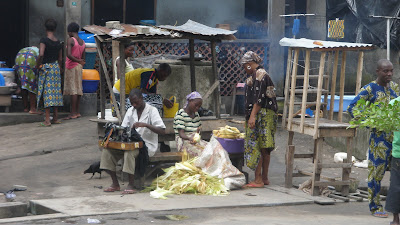Many of the church members are now able to walk from their homes to church, and I know they are very grateful to be spared a lengthy ride on an okada to church. Our congregation is small, but we are always so glad to be together and I've enjoyed the opportunity to get to know the Nigerians much better than I did in a larger congregation. The past few weeks I've been the only expat woman there -- most of the other American women and children are away for the summer. The Nigerian members always make me feel very loved and valued and I'm going to miss them all for the next two months while I'm away. Our building was formerly an eye clinic and is just off a main road on the island of Ikoyi. Here's our main meeting room:
 We were away the first week they met in the building, but I got this photo of the members (with some missionary visitors) the second week in the building.
We were away the first week they met in the building, but I got this photo of the members (with some missionary visitors) the second week in the building. There's always a good time mingling after services.
There's always a good time mingling after services.
This is a photo of the Ekong family. They are such wonderful people and a real strength to our congregation.

I had to get a photo of the beautiful women in this family. Priscilla, on the left, is a former AWC scholarship student, and her youngest sister, Victoria, on the right, is a new scholarship recipient. She was home for a short time and left later this day to go back to her college town. Their father is a retired policeman and their mother worked for the government (and is still waiting for the government to give her the pension she was promised and she's been retired for several years). I've so enjoyed getting to know and love them.









 This building is the dormitory.
This building is the dormitory.



























 There was American picnic food: burgers, hot dogs, ribs, potato salad, cole slaw and decorated cupcakes. The tents were assembled, as it's rainy season here and we can't hardly get through a day without a downpour. But the rain came in the morning before picnic time and the cloud cover kept the heat from being too oppressive. There were games for the kids and the adults. They managed to find someone willing to be dunked in the dunk booth even though the water was kind of brownish...
There was American picnic food: burgers, hot dogs, ribs, potato salad, cole slaw and decorated cupcakes. The tents were assembled, as it's rainy season here and we can't hardly get through a day without a downpour. But the rain came in the morning before picnic time and the cloud cover kept the heat from being too oppressive. There were games for the kids and the adults. They managed to find someone willing to be dunked in the dunk booth even though the water was kind of brownish...
 Our wonderful Consul General who will be leaving Lagos soon took a turn manning a game at the children's area.
Our wonderful Consul General who will be leaving Lagos soon took a turn manning a game at the children's area.
